A tale of two cities — double standards over the ‘liberation’ of Aleppo and Mosul
Last year’s bloody destruction of eastern Aleppo by the Assad regime and its allies received massive media coverage in the UK, all of it filled with outrage at the indiscriminate violence inflicted on civilians, combined with an outpouring of sympathy for the victims. This undoubtedly reflected in part the role of the mainstream media in supporting western foreign policy, which was (admittedly more at the level of political rhetoric than in actual practice) opposed both to Assad and to Russian intervention in Syria aimed at shoring up his regime. But media indignation at the bombardment of Aleppo was also based on the horrific realities of the situation.
The Assadist forces had, as an Amnesty International report from October 2016 put it, “callously attacked residential homes, medical facilities, schools, markets and mosques as part of a deliberate military strategy to empty the city of its inhabitants and seize control”. Lynn Maalouf of Amnesty’s Beirut office was quoted as saying: “The scale of the bloodshed and destruction wrought on eastern Aleppo city over the past month is harrowing. Syrian government forces, with the support of Russia, have launched relentless attacks that have flagrantly disregarded fundamental rules of international humanitarian law.” Throughout November and early December, with Assad and Putin intensifying their scorched-earth policy in eastern Aleppo, the destruction and death toll continued to mount. As the last remaining rebel districts fell, pro-regime forces carried out summary executions of suspected opposition sympathisers, including women and children. You didn’t have to be a media apologist for western foreign policy to be appalled by the carnage.
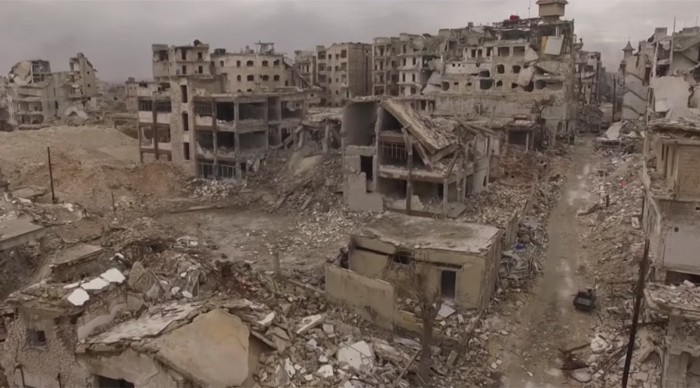
The onslaught on eastern Aleppo did, however, receive the enthusiastic support of one daily newspaper in the UK, the Morning Star. As the Assadist forces — mainly Iranian-sponsored foreign Shia militias, backed by Russian airstrikes — drove back the anti-Assad resistance and seized opposition-held territory, the Star welcomed these developments under the headline “Thousands freed from jihadist grip in eastern Aleppo”. Not only did this wilfully misrepresent the character of the opposition forces (Aleppo was a stronghold of the Free Syrian Army, Isis had been driven out of the city back in January 2014, and the jihadist group Jabhat Fateh al-Sham contributed perhaps 200 of the 8,000 opposition fighters) but the Morning Star’s editorial line was also clearly based on the premise that the massacre of civilians was a price worth paying for military victory.
“Human rights activists should welcome Syrian army advances in Aleppo”, the Star editorialised on 29 November. “Victory for President Bashar al-Assad is the most effective way to end the war in Syria and rescue civilians from the suffering that typifies all urban conflicts.” (Note the airy dismissal of the death and destruction in Aleppo as “the suffering that typifies all urban conflicts”.) The mission of the regime’s armed forces, the Star insisted, “can only be, in the best interests of the vast majority of Syrians, to inflict conclusive military defeat on the jihadist enemy to enable national reconstruction and reconciliation”.
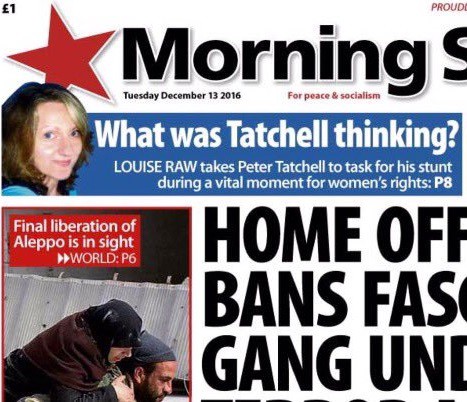 The Star’s 13 December edition featured the now notorious front-page claim that the “final liberation of Aleppo is in sight”. A hardline editorial rejected calls for compromise: “Every ceasefire so far struck in Syria has been ignored by the terror groups, and ultimately there will be no negotiated peace with the likes of Isis and al-Qaida. They must be fought and beaten. That is what is happening in Aleppo now….”
The Star’s 13 December edition featured the now notorious front-page claim that the “final liberation of Aleppo is in sight”. A hardline editorial rejected calls for compromise: “Every ceasefire so far struck in Syria has been ignored by the terror groups, and ultimately there will be no negotiated peace with the likes of Isis and al-Qaida. They must be fought and beaten. That is what is happening in Aleppo now….”
It was the Star’s front-page “liberation” line in particular that provoked an angry reaction, not least among right-wing Labour MPs. The Huffington Post reported that Mike Gapes had described the Morning Star’s response as “sick”, arguing that “Assad has created a killing field in Aleppo and calls it peace”. Ian Austin agreed: “After months of bombardment, people in Aleppo face slaughter tonight. Morning Star calls it ‘liberation’. Nauseating.” John Woodcock for his part declared: “I will never bow to twisted scum who think mass slaughter in Aleppo is ‘liberation’.”
Woodcock’s loudly proclaimed outrage at the sufferings of the people of eastern Aleppo didn’t prevent him from exploiting the situation in order to score political points against the Left. In fact his first thought was to denounce Jeremy Corbyn and his supporters on the basis that the Star had “sponsored the Momentum conference”. Woodcock added: “If you associate with this traitorous scum after this front page you’ve no place in our politics.” He went on to attack Corbyn’s strategy and communications director Seumas Milne, who of course has no control at all over the Star’s editorial decisions, by demanding: “Did you ask for this sickening front page calling Russian slaughter ‘liberation’?”
Predictably, this attempt to smear Corbyn and his supporters through association with the Morning Star’s line on Aleppo was taken up by the Tory press. The Telegraph reported Woodcock as saying: “That front page was an affront to common decency and underlines why you can’t be Labour Leader while you patronise a publication that is an official organ of the Communist party. Jeremy should defy his pro-Kremlin aides, explicitly condemn the Morning Star’s sickening stance and order Momentum to sever all ties with it.”
Corbyn himself, of course, had never said anything to indicate that he shared the Star’s line on the fall of eastern Aleppo. “I did not agree with it at all”, the Telegraph quoted him as saying. “My view is, and always has been, and always will be, there has to be a political settlement in Syria.” Indeed, in a letter to the prime minister, Corbyn had already stated: “Labour has long condemned all attacks on civilian targets, including those by Russian and pro-Syrian government forces in Aleppo, for which there can be no excuse.” This didn’t prevent the Telegraph from giving their report the misleading title “Jeremy Corbyn backs Morning Star after newspaper praises ‘liberation’ of Aleppo”, suggesting to the casual reader who got no further than the headline that Corbyn had endorsed the Star’s position.
It seems to me that anyone who was genuinely shocked by the Grozny-style razing of eastern Aleppo (rather than cynically using it to undermine Jeremy Corbyn’s leadership) should have been equally appalled by the no less horrendous devastation that has since been inflicted on the people of Mosul during the reconquest of that city. There are of course differences between the two situations. Unlike Aleppo, where the resistance was headed by the Free Syrian Army, the defending forces in Mosul were the murdering psychopaths of Isis. Nor is there any suggestion that US and Iraqi government forces specifically targeted hospitals and medical facilities in Mosul as was done in Aleppo. Yet the outcome was much the same in both cases. The reduction of a densely populated urban centre to rubble, with little concern for the inevitable civilian deaths that resulted, was accompanied by sectarian killings by the attackers following their military victory. The parallels are striking.
At the end of March the Washington Post noted a “sharp rise in the number of civilians reported killed in U.S.-led airstrikes in Iraq and Syria”, which was “spreading panic, deepening mistrust and triggering accusations that the United States and its partners may be acting without sufficient regard for lives of noncombatants”. It pointed out that this development had taken place since Donald Trump’s accession to the presidency, observing that during his election campaign he had criticised the Obama administration for being too “gentle” in its air war against Isis and had promised harsher measures. “I would bomb the shit out of them”, Trump declared, raising the prospect of “turning large swaths of Iraq and Syria into a smoking heap of debris and body parts”, as one prescient critic put it.
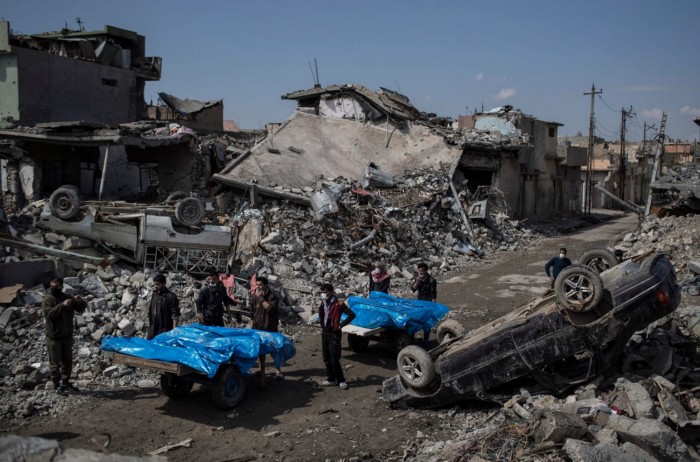
From the Washington Post article it appeared that Trump’s tougher policy on airstrikes was already being implemented: “In front-line neighborhoods in western Mosul, families described cowering in basements for weeks as bombs rained down around them.” The paper reported that “rescue teams are still digging out bodies after what residents describe as a hellish onslaught in the Mosul al-Jadida neighborhood during the battle to retake it two weeks ago. Iraqi officials and residents say as many as 200 died in U.S.-led strikes, with more than 100 bodies recovered from a single building”. This led to a temporary suspension of the Mosul offensive, but it soon resumed with even greater ferocity. Belkis Wille, senior Iraq researcher at Human Rights Watch, told NBC News that during the final stages of the campaign there had been a “massive uptick in ground fire” along with “the use of large 500–1,000-pound crater bombs that cause huge destruction and many deaths”.
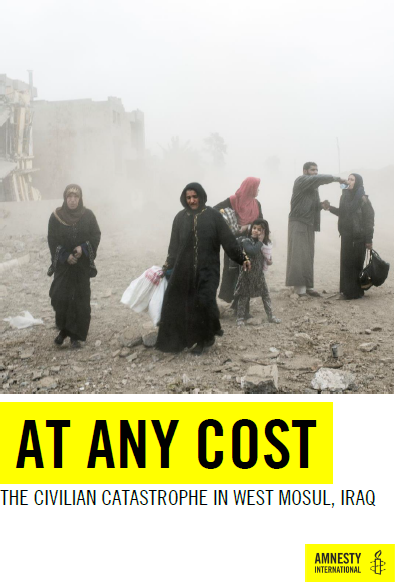 Amnesty International agreed with this assessment. Its recent report At Any Cost: The Civilian Catastrophe in West Mosul, Iraq states:
Amnesty International agreed with this assessment. Its recent report At Any Cost: The Civilian Catastrophe in West Mosul, Iraq states:
“Iraqi government and US-led coalition forces … carried out a series of unlawful attacks in west Mosul. Pro-government forces relied heavily upon explosive weapons with wide area effects such as IRAMs (Improvised Rocket Assisted Munitions). With their crude targeting abilities, these weapons wreaked havoc in densely populated west Mosul, where large groups of civilians were trapped in homes or makeshift shelters. Even in attacks that seem to have struck their intended military target, the use of unsuitable weapons or failure to take other necessary precautions resulted in needless loss of civilian lives and in some cases appears to have constituted disproportionate attacks.”
Exactly how many deaths resulted from this pitiless campaign in western Mosul is not yet known and probably never will be. Amnesty’s report refers to the independent monitoring group Airwars, who found that between 19 February and 19 June attacks by US-led coalition forces may have killed as many as 5,805 civilians, although Amnesty adds the qualification that “even this figure may be an underestimate”. I’m reluctant to cite Patrick Cockburn, whose reporting and analysis has proved highly unreliable, but it’s worth noting his interview with leading Kurdish politician and former Iraqi deputy prime minister Hoshyar Zebari, who stated that according to the Kurdistan Regional Government’s intelligence reports over 40,000 civilians had died during the Mosul campaign.
The results of this massacre have been described in detail by a correspondent for Middle East Eye who witnessed the sickening aftermath of the battle to “free” Mosul: “Hundreds of corpses lie half-buried in the broken masonry and rubble that was once a bustling, historic quarter. The stench of decaying flesh, which comes fast in the 50C summer heat, overwhelms the senses. Feet are the most distinguishable remains; there are many poking from the rubble. That final killing spree has left its mark, and it is one some appear keen to cover over. Over the last week, armoured bulldozers have trundled back and forth over the crumpled houses, grinding uncounted corpses into the rubble. But the dead refuse to go away. Rotting body parts glow a reddish-brown amid the pale grey of the undulating heatscape of masonry, dust and broken buildings. ‘There are many civilians among the bodies’, an Iraqi army major tells MEE.”
The major added that the dead civilians were not just accidental victims of the fight to oust Isis: “After liberation was announced, the order was given to kill anything or anyone that moved…. There is no law here now. Every day, I see that we are doing the same thing as Daesh. People went down to the river to get water because they were dying of thirst and we killed them.” Human Rights Watch has confirmed claims of extrajudicial killings, reporting that men and boys fleeing Mosul during the final days of the campaign to recapture Mosul were beaten and murdered, and that further summary executions of suspected militants followed the defeat of Isis. A video has emerged of Isis suspects being thrown off a cliff by members of the Iraqi armed forces before being shot. Sarah Leah Whitson, Middle East director at Human Rights Watch, stated: “Some Iraqi soldiers seem to have so little fear that they will face any consequence for murdering and torturing suspects in Mosul that they are freely sharing evidence of what look like very cruel exploits in videos and photographs. Excusing such celebratory revenge killings will haunt Iraq for generations to come.”
Nor is this situation entirely new. Summarising the situation in Mosul before the takeover by Isis, Belkis Wille of Human Rights Watch told the Observer: “Since 2003, Iraqi forces have carried out abuses against the civilian population with complete impunity, mainly targeting Sunni Arabs. They have carried out campaigns of arbitrary detention, enforced disappearance, torture and extrajudicial killings. These have all been key push factors for young Sunni Arab men to join Isis.” It is those same forces who now have control of the city once again, and are triumphantly flying flags proclaiming the restoration of Shia supremacy, while exacting retribution against the Sunni majority population. Some “liberation” for the people of Mosul.
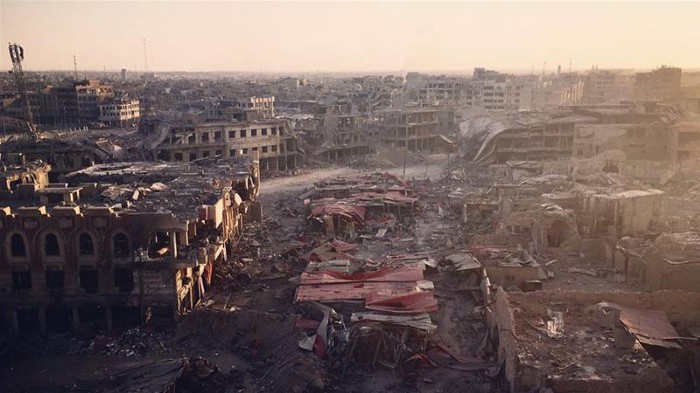
A couple of weeks ago I was discussing the similarities between Aleppo and Mosul with a journalist from the Morning Star. I criticised the mainstream media who (rightly in my view) denounced the slaughter of civilians carried out by the Assad regime and its allies during the campaign against eastern Aleppo, but have shown considerably less interest in publicising the mass killings resulting from the war in Mosul. I said I thought the Left should condemn both. The Morning Star comrade looked a bit uncomfortable and said there were bound to be civilian casualties when wars were waged in cities. I was rather taken aback by this. Despite its earlier line on Aleppo, I’d assumed the Star would follow Amnesty and Human Rights Watch in condemning the atrocities committed by US imperialism and its allies in Mosul. However, when I checked, I discovered that the paper’s position was not much different from the one they adopted last year when they celebrated the “liberation” of eastern Aleppo.
To be fair, I did find one comment piece from the 29 June edition of the Star (“Western terror bolsters Isis terror”) which opposed western air wars in Syria and Iraq (although the author, Ian Sinclair, is only an occasional columnist for the Star and does not follow its editorial line). There was also an article in November last year based on an Amnesty report that civilians suspected of links to Isis had been tortured and killed by Iraqi forces (although the article concluded with the assurance that “the campaign to liberate Mosul continued yesterday, with Iraqi troops reportedly consolidating their gains around the city”). Otherwise, the Star’s reports have presented the campaign to retake Mosul in an almost entirely positive light, without displaying any sign of revulsion at the mass civilian casualties caused by the offensive. Typical headlines have read “Iraqi troops begin fight to free Mosul” (18 October), “Iraqi soldiers liberate more of Mosul” (13 December), “Iraq: government troops make big gains in fight for Mosul” (24 February), “Iraq: troops break through to western Mosul” (11 May) and “Isis death cult militants nearly driven from Mosul” (10 July).
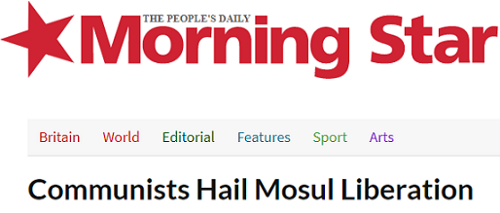 Here, for example, under the headline “Communists hail Mosul liberation”, is the Star on 13 July reporting with evident approval that the Iraqi Communist Party had acclaimed the reconquest of the city. The party had even declared its admiration for the “heroism and sacrifice for the cause of liberation” demonstrated by the Popular Mobilisation Units, the notorious Shia-sectarian militias that have a well-established record of carrying out atrocities against Sunnis.
Here, for example, under the headline “Communists hail Mosul liberation”, is the Star on 13 July reporting with evident approval that the Iraqi Communist Party had acclaimed the reconquest of the city. The party had even declared its admiration for the “heroism and sacrifice for the cause of liberation” demonstrated by the Popular Mobilisation Units, the notorious Shia-sectarian militias that have a well-established record of carrying out atrocities against Sunnis.
The Star’s report added that “the US-led coalition condemned an Amnesty International report on Monday alleging that the Iraqi army may have committed war crimes in Mosul amid the vicious street-fighting with Isis gunmen and suicide bombers in the northern city”. The implication seemed to be that, even if such crimes had indeed been committed, this was only to be expected in the heat of battle. Amnesty’s response to criticisms of its report was not mentioned. Indeed, judging by the paper’s online archives, that brief reference was the only coverage by the Star of Amnesty’s detailed analysis of the devastating consequences of the military policy pursued by the US and its allies in Mosul.
The Star’s approach does at least have the merit of consistency. Why take a stand against a military strategy that results in the slaughter of civilians in Iraq when you’ve previously backed a similar strategy in Syria? By contrast, the mainstream media who expressed such shock and horror over the death and destruction in Aleppo have mostly done a U-turn over Mosul. They tend towards the Morning Star’s view that the indiscriminate killing by US and Iraqi forces was a regrettable but inevitable cost of war, justified by the need to defeat Isis. It seems that death and destruction are much less horrific when they serve the interests of western foreign policy. The Telegraph, which last year led the charge against Jeremy Corbyn over his association with the Star, now sees the bloody victory in Mosul as a milestone in the war on terror (“The liberation of Mosul confirms that Isil’s days are numbered, but another battle is just beginning”), while dismissing criticisms of the means by which it was achieved (“‘They have no understanding of brutality of war’, says British commander over Amnesty’s Mosul ‘war crimes’ report”).
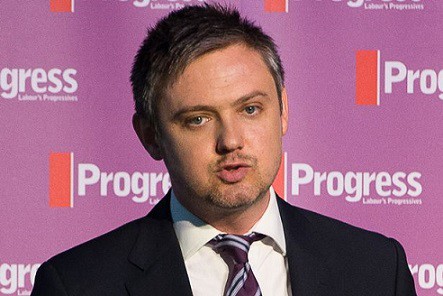 And what of John Woodcock, the Labour MP who expressed such unrestrained fury at the Morning Star over its “liberation of Aleppo” front page and demanded that Jeremy Corbyn and his supporters should break all links with the paper? Has Woodcock taken a similarly strong line against the actions of the US and its allies in Mosul? Has he condemned the slaughter of innocent civilians in US airstrikes, and the torture and murder carried out by Iraqi government forces? Has he called on Corbyn to dissociate himself from the Morning Star over its stance on the annihilation of western Mosul? Of course not. In an article for Labour List co-authored with Progress chair Alison McGovern, all Woodcock was prepared to concede was that there have been “reports of worryingly high civilian casualties caused by some of our allies”. Which didn’t prevent him from applauding “the enormously welcome liberation of Mosul”.
And what of John Woodcock, the Labour MP who expressed such unrestrained fury at the Morning Star over its “liberation of Aleppo” front page and demanded that Jeremy Corbyn and his supporters should break all links with the paper? Has Woodcock taken a similarly strong line against the actions of the US and its allies in Mosul? Has he condemned the slaughter of innocent civilians in US airstrikes, and the torture and murder carried out by Iraqi government forces? Has he called on Corbyn to dissociate himself from the Morning Star over its stance on the annihilation of western Mosul? Of course not. In an article for Labour List co-authored with Progress chair Alison McGovern, all Woodcock was prepared to concede was that there have been “reports of worryingly high civilian casualties caused by some of our allies”. Which didn’t prevent him from applauding “the enormously welcome liberation of Mosul”.
First published on Medium in July 2017